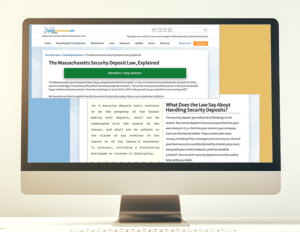Following the Money: Security Deposits Beyond the Reach of Landlord’s Creditors, not DOR
. Posted in News - 0 Comments
By Peter Vickery, Esq., Legislative Affairs Counsel
Note: This article was originally published September 2019.
Members of MassLandlords know that they have to put security deposits in a separate, interest-bearing account beyond the reach of the landlord’s creditors. But what about the tenant’s creditors, e.g. the Commonwealth? More specifically, if the Massachusetts Department of Revenue (DOR) wants to collect from a tenant for unpaid taxes or child support, can it reach into a security-deposit account? The answer is yes.

Massachusetts law allows DOR to levy bank accounts in order to enforce child-support payments (c. 119A) and taxes (c. 62C). First, the department has to issue a levy notice to the bank, which must then search its records looking for a match with the name or tax identification number on the DOR notice. If it finds a match – even if the person owing taxes or child support is listed as a joint or co-owner of the account – the bank must suspend activity for 21 days. During this period, the account owners can ask the department to review the decision.
The statutes exempt certain accounts from levy, but security deposit accounts are not among them. This may come as a surprise to some, but it is consistent with the purpose and rationale of the security deposit law, M.G.L. c. 186, §15B.
Money in a security-deposit account belongs to the tenant, not the landlord. As the Supreme Judicial Court has made clear, putting the money in a separate account means that “tenant monies are protected from potential diversion to the personal use of the landlord, earn interest for the tenant, and are kept from the reach of the landlord’s creditors.” Neihaus v. Maxwell, 54 Mass. App. Ct. 558, 561 (2002).
Landlords are, in effect, trustees of their tenants’ security deposits, holding the money in a fiduciary capacity. That is how the US Bankruptcy Court interprets the statute. In re. Bologna, 206 B.R. 628 (1997).
Because the money is the tenant’s, and it is not in one of the categories exempt from seizure, the DOR can (and sometimes does) levy it. If a landlord learns from the bank that DOR has frozen the security-deposit account, what can the landlord do? During the 21-day holding period, the landlord may ask DOR, in writing, to reconsider (a phone call is not sufficient). After that, if DOR has already taken the money, landlords may challenge the levy as wrongful and apply for a refund.
In the event that a landlord only learns about the levy after the event, e.g. when trying to lawfully use the security to pay for repairs after the tenancy has terminated, but the bank refuses to disclose the reason for the zero balance, a landlord could seek equitable relief and judicial review. Specifically, the landlord could ask a court to compel the bank to explain what happened, and then ask the court to review the DOR decision.





